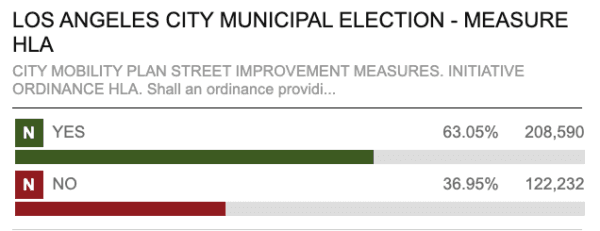Measure HLA, which seeks to make Los Angeles streets more accessible and safer, is currently winning in early March 5 primary results.
According to the Los Angeles County registrar, the measure has over 64.7 percent of the vote approving to about 35.3 percent against, as of March 11.
It needs a majority of voters approving the measure to pass.

Updates as of 4:31 p.m., March 6. (Los Angeles County Registrar-Recorder/County Clerk/Screenshot via California Insider)
Measure HLA would implement the city’s 2015 approved Mobility Plan 2035 to upgrade more than 2,500 miles of city streets, of which only 5 percent has been completed, according to its sponsors.
The plan will ensure “the city finishes its plan for thousands of miles of safer streets in LA,” said supporters, by requiring the city to build bike and bus lanes, widen sidewalks, add crosswalks and other safety features—making streets more accessible to pedestrians and public transit—each time it repaves streets.
The measure would accelerate the plan’s completion within 5 to 15 years, instead of an estimated 160 years at the city’s current pace, according to sponsors.
“Each resurfacing requires LADOT to re-stripe the street afterwards—an opportunity to implement the Mobility Plan at minimal cost,” stated the campaign in support of the measure.
Opponents of the measure argue it will slow down emergency response times, increase traffic, and cost the city significantly over the next ten years.
A report last month by the Los Angeles City Administrative Office indicated the measure could cost $3.1 billion over 10 years, with two-thirds going to fund the repair of nearly 100 miles of sidewalk.
But sponsors of the measure say no such sidewalk repair is required in the city’s Mobility Plan and accused the City Administrative Office of “playing politics,” in a statement on the campaign’s website.
The campaign also argued bike lane costs were exaggerated and four times higher than what the city has spent on recent improvements.
“Measure HLA will not cause a significant impact on the City’s general fund, and would be an affordable program to fix our dangerous streets and save lives,” it said.
Based on their own calculations, sponsors estimate the measure will cost about $286 million through 2035.












